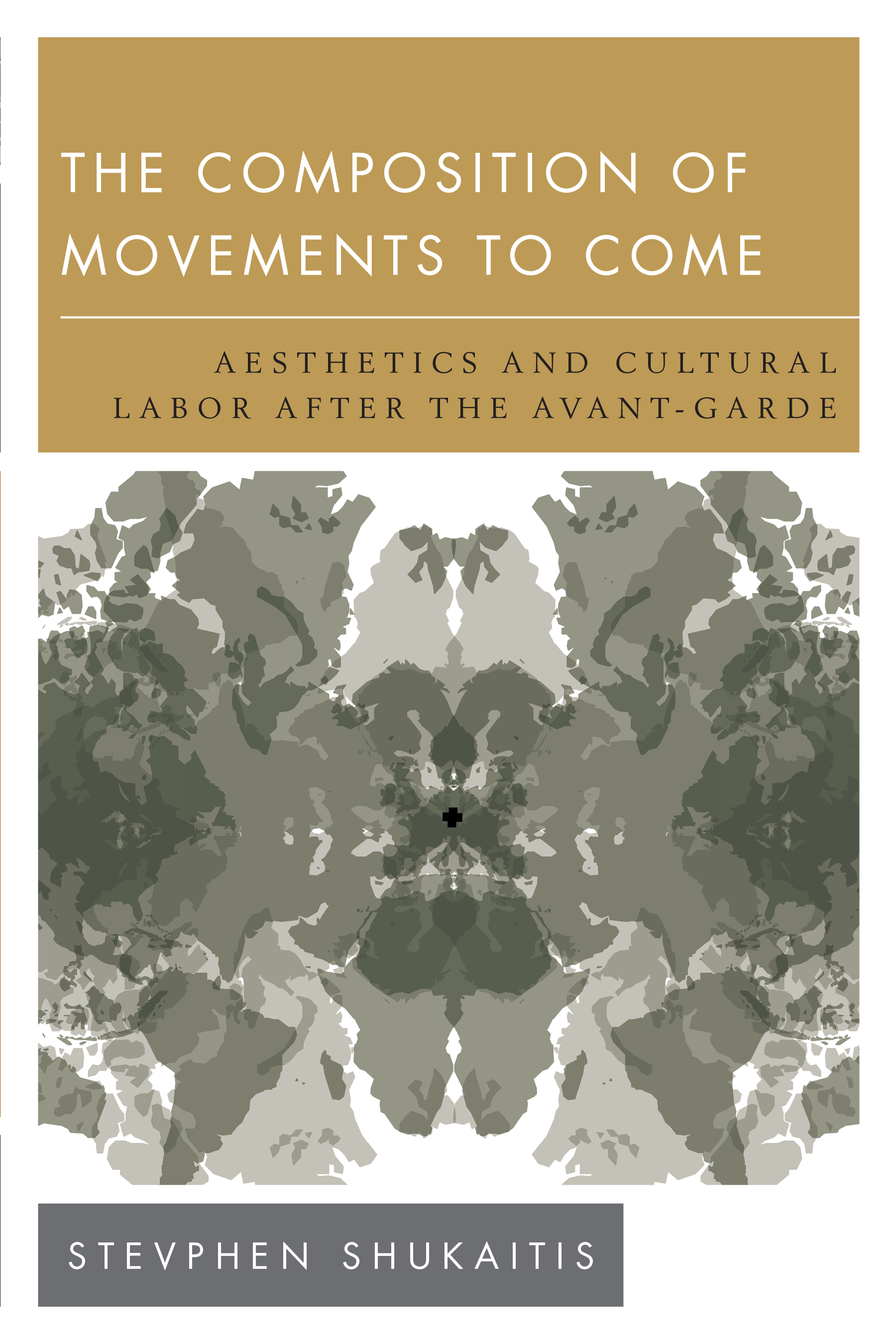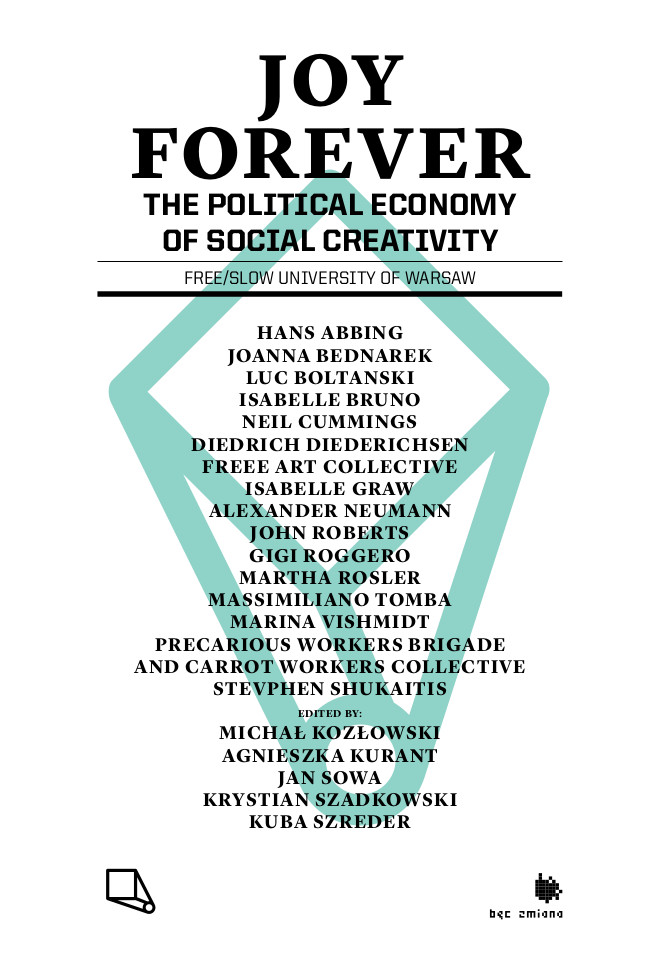Stevphen Shukaitis: The Composition of Movements to Come: Aesthetics and Cultural Labor after the Avant-Garde (2016)
Filed under book | Tags: · aesthetics, affect, antagonism, art history, autonomy, avant-garde, capitalism, class, creativity, everyday, imagination, immanence, labour, marxism, media, organization, situationists, strategy, value

“How does the avant-garde create spaces in everyday life that subvert regimes of economic and political control? How do art, aesthetics and activism inform one another? And how do strategic spaces of creativity become the basis for new forms of production and governance?
The Composition of Movements to Come reconsiders the history and the practices of the avant-garde, from the Situationists to the Art Strike, revolutionary Constructivism to Laibach and Neue Slowenische Kunst, through an autonomist Marxist framework. Moving the framework beyond an overly narrow class analysis, the book explores broader questions of the changing nature of cultural labor and forms of resistance around this labor. It examines a doubly articulated process of refusal: the refusal of separating art from daily life and the re-fusing of these antagonistic energies by capitalist production and governance. This relationship opens up a new terrain for strategic thought in relation to everyday politics, where the history of the avant-garde is no longer separated from broader questions of political economy or movement, but becomes a point around which to reorient these considerations.”
Publisher Rowman & Littlefield, London & New York, 2016
New Politics of Autonomy series
ISBN 9781783481736, 1783481730
xx+176 pages
Reviews: Gregory Sholette (Critical Inquiry, 2015), Marc James Léger (Afterimage, 2016), Martin Parker (Culture Machine, 2017).
PDF (4 MB)
Comment (0)Ruth Catlow, Marc Garrett, Nathan Jones, Sam Skinner (eds.): Artists Re:thinking the Blockchain (2017)
Filed under book | Tags: · algorithm, art, bitcoin, blockchain, cryptocurrency, data, money, trust, value

“The blockchain is widely heralded as the new internet – another dimension in an ever-faster, ever-more-powerful interlocking of ideas, actions and values. Principally the blockchain is a ledger distributed across a large array of machines that enables digital ownership and exchange without a central administering body. Within the arts it has profound implications as both a means of organising and distributing material, and as a new subject and medium for artistic exploration. This landmark publication brings together a diverse array of artists and researchers engaged with the blockchain, unpacking, critiquing and marking the arrival of it on the cultural landscape for a broad readership across the arts and humanities.”
Contributors: César Escudero Andaluz, Jaya Klara Brekke, Theodoros Chiotis, Ami Clarke, Simon Denny, The Design Informatics Research Centre (Edinburgh), Max Dovey, Mat Dryhurst, Primavera De Filippi, Peter Gomes, Elias Haase, Juhee Hahm, Max Hampshire, Kimberley ter Heerdt, Holly Herndon, Helen Kaplinsky, Paul Kolling, Elli Kuruş, Nikki Loef, Bjørn Magnhildøen, Rob Myers, Martín Nadal, Rachel O’Dwyer, Edward Picot, Paul Seidler, Hito Steyerl, Surfatial, Lina Theodorou, Pablo Velasco, Ben Vickers, Mark Waugh, Cecilia Wee, and Martin Zeilinger.
Publisher Torque Editions & Furtherfield, London, 2017
ISBN 0993248748, 9780993248740
344 pages
via Torque Editions
Reviews: Régine Debatty (We Make Money Not Art, 2017), Alessandro Ludovico (Neural, 2017).
Publisher
Distributor
WorldCat
Joy Forever: The Political Economy of Social Creativity (2014)
Filed under book | Tags: · art, creativity, labour, resistance, value

“The title Joy Forever refers to the false promise of a common happiness, constantly played out by the proponents of the creative class and creative economy – the very promise that since Romanticism has been ascribed to art itself, a vow which remains unfulfilled. The aim of the publication is to scrutinize the false promises of distributed creativity as an ideology of cognitive capitalism. The authors devote themselves to critical examination of the structural links between art, creativity, labour and the creation of value under contemporary relations of production. Some of them do not stop at a critical diagnosis but go further, reflecting upon potential alternatives to the status quo.
The book covers more than the issues of a narrowly understood art world, despite the fact that it pays a lot of attention to them. Art is conceived here as a social lab, where innovative ways of organizing of labour, socializing both for labour and through labour, as well as different types of production, speculation, generation and accumulation and appropriation of value are experimented with and tested.
The book gathers papers based on presentations at the conference Labour of the Multitudes? Political Economy of Social Creativity, organized in Warsaw in October 2011. It includes contributions by Luc Boltanski, Neil Cummings, Diedrich Diederichsen, Isabelle Graw, Massimiliano Tomba, Stevphen Shukaitis, Martha Rosler, and others.”
Edited by Michał Kozłowski, Agnieszka Kurant, Jan Sowa, Krystian Szadkowski and Jakub Szreder
Publisher Free/Slow University of Warsaw, in cooperation with MayFly Books, London, 2014
Creative Commons BY-NC-ND 4.0 International License
ISBN 9781906948191, 1906948194
xviii+274 pages
Publisher (EN)
Publisher (PL)
WorldCat

